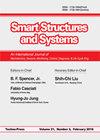Experimental and numerical investigation of the effect of bridge area and its angularities on the failure mechanism of non-persistent crack in concrete-like materials
IF 2.2
3区 工程技术
Q2 ENGINEERING, CIVIL
引用次数: 3
Abstract
Experimental and discrete element methods were used to investigate the effects of distance between two preexisting cracks, bridge area (The length of the bridge area) and its angularities on the shear behaviour of bridge area. A punchthrough shear test was used to model the gypsum (concrete like) cracks under shear loading. Gypsum samples (concrete like) with dimension of 120 mm × 120 mm × 50 mm were prepared in the laboratory. Within the specimen model and near its four corners, four vertical notches were provided. Three different configuration systems were prepared for notches; i.e., paralell and in plane, inside echelon and outside echelon configuration systems, respectively. In these configurations, the length of cracks were taken as 2 cm, 4 cm and 6 cm based on the cracks configuration systems. Then, 9 specimens with different lengths of the bridge area and bridge area angles were prepared. Assuming a plane strain condition, special rectangular models were prepared with dimensions of 100 mm × 100 mm. similar to those for cracks configuration systems in the experimental tests i.e., 9 models with different lengths of the bridge area and bridge area angularities were prepared. The axial load was applied to the punch through the central portion of the model. This testing showed that the failure process was mostly governed by the lengths of the bridge area and bridge area angularities. The shear strengths of the specimens were related to the fracture pattern and failure mechanism of the discontinuities. It was shown that the shear behaviour of discontinuities is related to the number of the induced tensile cracks which are increased by increasing the lengths of the bridge area. The strength of samples decreases by increasing the crack length. Also, the outside echelon crack configuration system has the maximum value of strength while the inside echelon crack configuration system has the minimum value of specimen's tensile strength. The failure pattern and failure strength are similar in both methods i.e., the experimental testing and the numerical simulation methods.桥梁面积及其角度对类混凝土材料非持久性裂缝破坏机理影响的实验和数值研究
采用实验和离散元方法研究了两个预先存在的裂缝之间的距离、桥梁区域(桥梁区域的长度)及其角度对桥梁区域剪切性能的影响。采用冲切剪切试验对剪切荷载作用下的石膏(类混凝土)裂缝进行建模。在实验室中制备了尺寸为120mm×120mm×50mm的石膏样品(类似混凝土)。在样品模型内及其四个角附近,提供了四个垂直缺口。为缺口准备了三种不同的配置系统;即,平行和平面内、内部梯队和外部梯队配置系统。在这些配置中,基于裂纹配置系统,裂纹的长度取为2cm、4cm和6cm。然后,制备了9个具有不同桥面积长度和桥面积角度的试样。假设在平面应变条件下,制备了尺寸为100 mm×100 mm的特殊矩形模型。与实验测试中的裂纹配置系统类似,即制备了9个具有不同桥梁区域长度和桥梁区域角度的模型。轴向载荷通过模型的中心部分施加到冲头上。该测试表明,破坏过程主要由桥梁区域的长度和桥梁区域的角度决定。试件的剪切强度与不连续面的断裂模式和破坏机制有关。研究表明,不连续性的剪切行为与诱导的拉伸裂纹数量有关,拉伸裂纹的数量随着桥梁区域长度的增加而增加。试样的强度随着裂纹长度的增加而降低。此外,外侧梯形裂纹结构体系具有最大的强度值,而内侧梯形裂纹结构系统具有最小的试样抗拉强度值。实验测试和数值模拟两种方法的失效模式和失效强度相似。
本文章由计算机程序翻译,如有差异,请以英文原文为准。
求助全文
约1分钟内获得全文
求助全文
来源期刊

Smart Structures and Systems
工程技术-工程:机械
CiteScore
6.50
自引率
8.60%
发文量
0
审稿时长
9 months
期刊介绍:
An International Journal of Mechatronics, Sensors, Monitoring, Control, Diagnosis, and Management airns at providing a major publication channel for researchers in the general area of smart structures and systems. Typical subjects considered by the journal include:
Sensors/Actuators(Materials/devices/ informatics/networking)
Structural Health Monitoring and Control
Diagnosis/Prognosis
Life Cycle Engineering(planning/design/ maintenance/renewal)
and related areas.
 求助内容:
求助内容: 应助结果提醒方式:
应助结果提醒方式:


